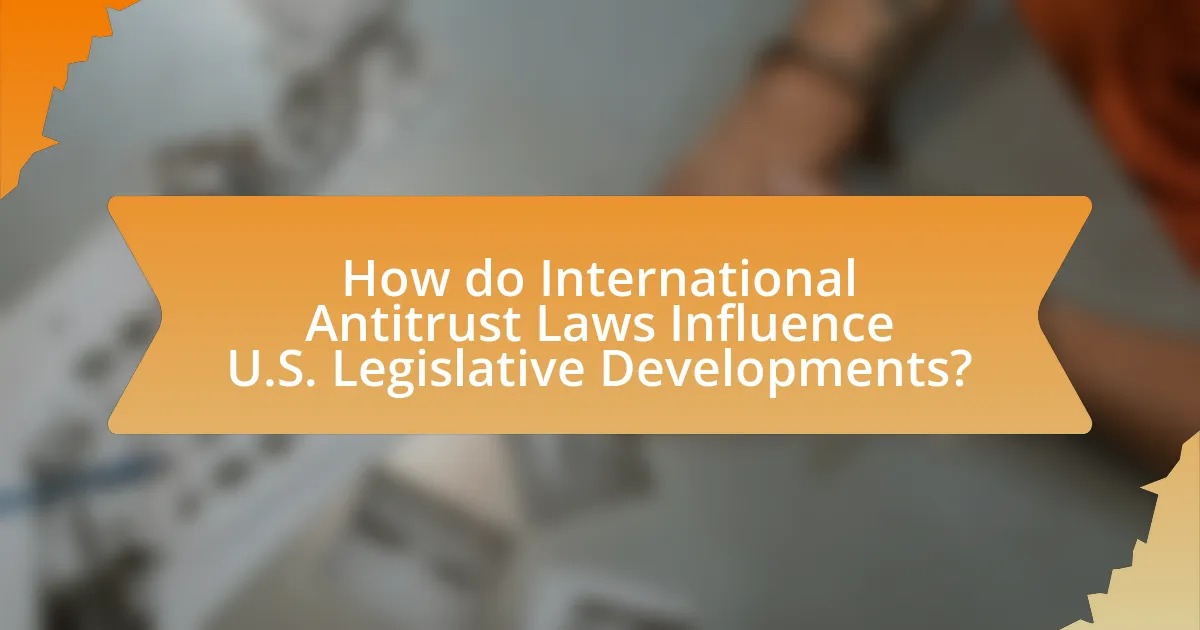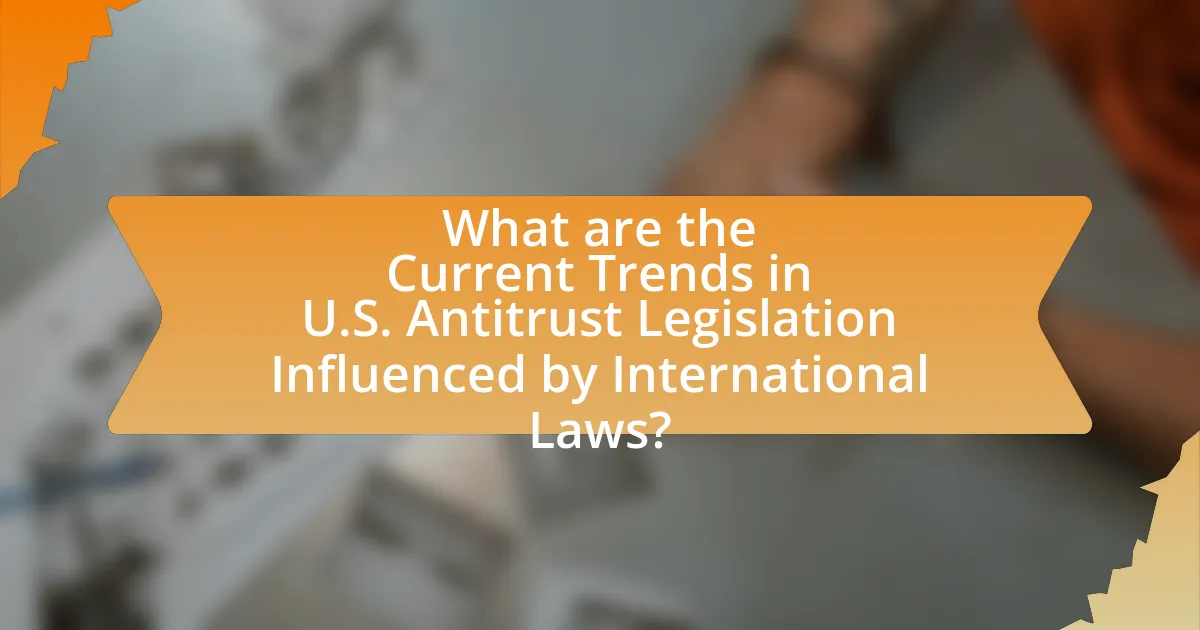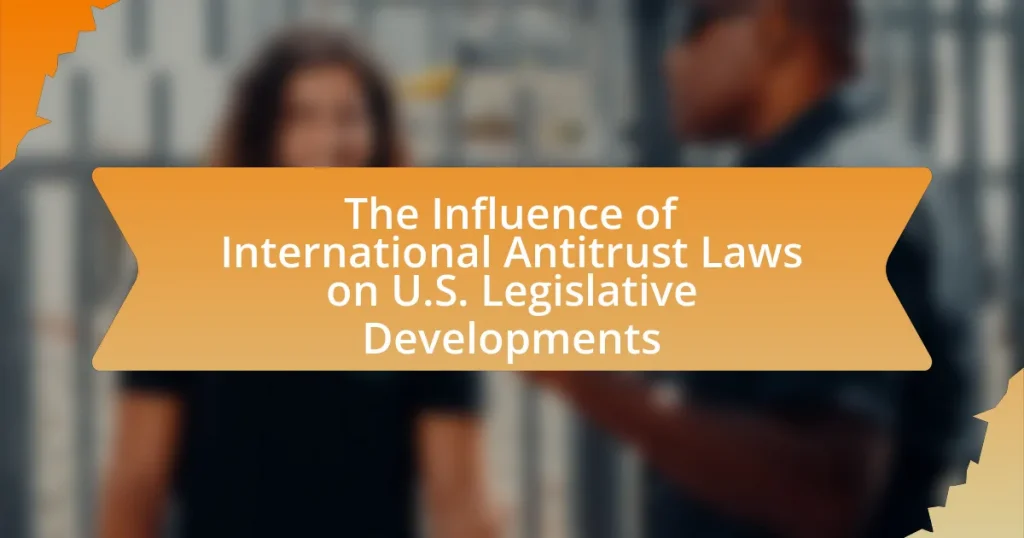International antitrust laws are regulations designed to govern competition among businesses across national borders, aiming to prevent anti-competitive practices such as monopolies and cartels. This article explores the purpose and principles of these laws, highlighting their differences from U.S. antitrust laws, which primarily focus on domestic markets. It examines how international antitrust regulations influence U.S. legislative developments, including recent trends and specific laws that align with global standards. Additionally, the article discusses the implications for businesses operating in the U.S. and best practices for compliance in an evolving regulatory landscape.

What are International Antitrust Laws and Their Purpose?
International antitrust laws are regulations that govern competition between businesses across national borders to prevent anti-competitive practices such as monopolies and cartels. Their primary purpose is to promote fair competition, protect consumer welfare, and ensure a level playing field in the global market. For instance, the OECD’s 2019 report highlighted that effective international cooperation in antitrust enforcement can lead to better outcomes for consumers by addressing cross-border anti-competitive behavior.
How do International Antitrust Laws differ from U.S. Antitrust Laws?
International antitrust laws differ from U.S. antitrust laws primarily in their scope and enforcement mechanisms. While U.S. antitrust laws, such as the Sherman Act and the Clayton Act, focus on preventing anti-competitive practices within the domestic market, international antitrust laws, like those established by the European Union, often emphasize cooperation among countries and address cross-border anti-competitive behavior. For instance, the EU’s competition law includes provisions for merger control and state aid that are more stringent than U.S. regulations, reflecting a broader regulatory approach to market fairness. Additionally, international laws often involve multilateral agreements that facilitate collaboration among nations, whereas U.S. laws are primarily enforced by domestic agencies like the Federal Trade Commission and the Department of Justice.
What are the key principles of International Antitrust Laws?
The key principles of International Antitrust Laws include the promotion of competition, prevention of monopolistic practices, and protection of consumer welfare. These laws aim to ensure that markets remain open and competitive, which is essential for innovation and economic efficiency. For instance, the OECD emphasizes that effective antitrust enforcement can lead to lower prices and improved quality of goods and services. Additionally, the principles often involve cooperation among countries to address cross-border anti-competitive behavior, as seen in agreements like the International Competition Network, which facilitates collaboration among antitrust authorities globally.
How do these principles impact global trade?
International antitrust laws significantly impact global trade by promoting fair competition and preventing monopolistic practices across borders. These laws encourage a level playing field, which facilitates trade by ensuring that companies compete based on merit rather than anti-competitive behaviors. For instance, the enforcement of antitrust regulations can lead to the dismantling of cartels that inflate prices, thereby benefiting consumers and fostering a more dynamic market environment. Additionally, countries that align their antitrust laws with international standards, such as those set by the OECD, often experience increased foreign direct investment, as businesses seek stable and predictable regulatory frameworks. This alignment can enhance trade relations and economic cooperation among nations, ultimately contributing to a more integrated global economy.
Why are International Antitrust Laws important for global markets?
International Antitrust Laws are crucial for global markets because they promote fair competition and prevent monopolistic practices across borders. These laws ensure that companies cannot engage in anti-competitive behavior that would harm consumers or stifle innovation, thereby fostering a level playing field in international trade. For instance, the enforcement of these laws can lead to significant penalties for companies that violate them, as seen in cases like the European Union’s fines against Google for anti-competitive practices, which totaled over €8 billion. This regulatory framework not only protects consumers but also encourages investment and economic growth by creating a stable and predictable market environment.
What role do these laws play in promoting competition?
International antitrust laws play a crucial role in promoting competition by establishing a framework that prevents monopolistic practices and encourages market entry. These laws, such as the Sherman Act and the Clayton Act in the U.S., prohibit anti-competitive agreements and abuse of market power, ensuring that no single entity can dominate the market to the detriment of consumers and other businesses. For instance, the enforcement of these laws has led to significant cases, such as the breakup of AT&T in the 1980s, which fostered competition in the telecommunications sector, resulting in lower prices and improved services for consumers. By maintaining a competitive landscape, these laws stimulate innovation and economic growth, benefiting the overall market.
How do they protect consumers internationally?
International antitrust laws protect consumers by promoting fair competition and preventing monopolistic practices across borders. These laws, enforced by various international organizations such as the OECD and the European Commission, ensure that companies cannot engage in anti-competitive behavior that harms consumers, such as price-fixing or market division. For instance, the OECD’s guidelines on competition policy encourage member countries to adopt laws that align with international standards, thereby fostering a competitive marketplace that benefits consumers globally. This collaborative approach helps maintain lower prices, better quality products, and innovation, ultimately safeguarding consumer interests on an international scale.

How do International Antitrust Laws Influence U.S. Legislative Developments?
International antitrust laws significantly influence U.S. legislative developments by shaping regulatory frameworks and enforcement practices. The U.S. often aligns its antitrust policies with international standards to facilitate trade and cooperation, as seen in agreements like the OECD Guidelines for Multinational Enterprises. These guidelines encourage member countries, including the U.S., to adopt fair competition practices, which can lead to legislative changes that enhance market competition and consumer protection. Additionally, the U.S. engages in international dialogues, such as those through the International Competition Network, which promote best practices and harmonization of antitrust laws, further impacting domestic legislation.
What historical events have shaped the relationship between U.S. laws and International Antitrust Laws?
The relationship between U.S. laws and International Antitrust Laws has been shaped by several key historical events, including the establishment of the Sherman Antitrust Act in 1890, the formation of the International Competition Network in 2001, and the adoption of the OECD Guidelines for Multinational Enterprises in 1976. The Sherman Antitrust Act laid the groundwork for U.S. antitrust enforcement, influencing global standards by promoting competition and prohibiting monopolistic practices. The International Competition Network facilitated cooperation among antitrust authorities worldwide, enhancing the alignment of U.S. laws with international practices. Additionally, the OECD Guidelines provided a framework for multinational corporations, impacting how U.S. companies operate internationally and adhere to antitrust principles. These events collectively illustrate the evolving interplay between U.S. antitrust legislation and international norms, reflecting a trend toward greater harmonization in competition law.
How did the globalization of markets affect U.S. antitrust legislation?
The globalization of markets has led to significant adaptations in U.S. antitrust legislation, primarily by increasing the focus on international competition and cooperation. As U.S. companies expanded their operations globally, lawmakers recognized the need to address anti-competitive practices that transcended national borders. This shift prompted the U.S. to engage more actively with international antitrust frameworks, such as the OECD Guidelines and the UNCTAD Model Law, which influenced domestic policies. For instance, the Antitrust Modernization Commission in 2007 highlighted the importance of aligning U.S. antitrust laws with global standards to effectively combat anti-competitive behavior in a globalized economy.
What major cases illustrate this influence?
Major cases that illustrate the influence of international antitrust laws on U.S. legislative developments include the Microsoft antitrust case and the European Union’s Google antitrust decisions. The Microsoft case, initiated in 1998, highlighted the impact of monopolistic practices on competition and led to significant changes in U.S. antitrust enforcement, aligning it more closely with international standards. Similarly, the European Union’s actions against Google for anti-competitive behavior in 2017 reinforced the importance of global antitrust principles, prompting U.S. lawmakers to reconsider their regulatory approaches to technology companies. These cases demonstrate how international antitrust frameworks can shape domestic legislation and enforcement strategies.
In what ways do U.S. lawmakers respond to International Antitrust Laws?
U.S. lawmakers respond to International Antitrust Laws primarily by aligning domestic antitrust regulations with global standards, engaging in international cooperation, and adapting legislation to address cross-border competition issues. For instance, the U.S. has participated in international forums such as the OECD and the International Competition Network, which promote best practices in antitrust enforcement. Additionally, lawmakers have introduced bills that reflect international norms, such as the proposed updates to the Sherman Act and the Clayton Act, which aim to enhance the ability to tackle anti-competitive practices that span multiple jurisdictions. These actions demonstrate a commitment to harmonizing U.S. antitrust laws with international frameworks, ensuring that American businesses remain competitive in a global market.
How do these responses manifest in new legislation?
Responses to international antitrust laws manifest in new U.S. legislation through the incorporation of stricter competition policies and regulatory frameworks. For instance, the U.S. Congress has introduced bills aimed at enhancing antitrust enforcement, reflecting global standards set by organizations like the OECD and the European Union. These legislative changes often include provisions for increased scrutiny of mergers and acquisitions, as seen in the proposed American Innovation and Choice Online Act, which seeks to prevent anti-competitive practices by major tech companies. Such legislative actions demonstrate a direct alignment with international antitrust principles, ensuring that U.S. laws evolve in response to global economic dynamics and competitive fairness.
What are the challenges faced by U.S. lawmakers in this context?
U.S. lawmakers face significant challenges in reconciling domestic antitrust laws with international antitrust frameworks. These challenges include navigating differing regulatory standards, as many countries have varying definitions and enforcement mechanisms for antitrust violations, which complicates cross-border business operations. Additionally, lawmakers must address the influence of multinational corporations that may lobby for favorable regulations, potentially undermining domestic competition. The complexity of international trade agreements also poses a challenge, as lawmakers must ensure that U.S. antitrust policies align with commitments made in these agreements while protecting national interests. Furthermore, the rapid pace of technological advancement complicates the legislative process, as lawmakers struggle to keep up with new market dynamics and the implications for competition.

What are the Current Trends in U.S. Antitrust Legislation Influenced by International Laws?
Current trends in U.S. antitrust legislation influenced by international laws include a heightened focus on digital markets, increased scrutiny of mergers and acquisitions, and a collaborative approach to enforcement with foreign regulators. The U.S. government is increasingly aligning its antitrust policies with international standards, particularly in response to the European Union’s rigorous regulatory framework. For instance, the Federal Trade Commission and the Department of Justice have adopted practices that reflect the EU’s emphasis on consumer welfare and market competition, as seen in recent high-profile cases against major tech companies. This alignment is evidenced by the U.S. agencies’ participation in international forums, such as the International Competition Network, which fosters cooperation and consistency in antitrust enforcement globally.
How are recent legislative changes reflecting international standards?
Recent legislative changes in the U.S. are increasingly aligning with international antitrust standards by incorporating principles that promote fair competition and consumer protection. For instance, the introduction of the American Innovation and Choice Online Act reflects the European Union’s approach to regulating large tech companies, emphasizing the need for transparency and accountability in digital markets. This alignment is further evidenced by the Federal Trade Commission’s recent actions, which mirror the EU’s rigorous enforcement of antitrust laws, aiming to prevent anti-competitive practices. Such legislative shifts demonstrate a commitment to harmonizing U.S. laws with global standards, ensuring that domestic regulations are consistent with international norms in promoting competitive markets.
What specific laws have been enacted or amended recently?
Recently, the American Innovation and Choice Online Act and the Open App Markets Act have been introduced to address antitrust concerns in the technology sector. These laws aim to prevent large tech companies from engaging in anti-competitive practices that could harm consumers and smaller businesses. The American Innovation and Choice Online Act specifically targets practices that unfairly disadvantage competing products, while the Open App Markets Act focuses on ensuring fair access to app stores. These legislative efforts reflect a growing recognition of the need for regulatory frameworks that align with international antitrust standards, particularly in response to similar initiatives in the European Union.
How do these changes align with international practices?
The changes align with international practices by adopting principles that mirror global antitrust standards, such as promoting competition and preventing monopolistic behaviors. For instance, the U.S. has increasingly incorporated guidelines from organizations like the OECD and the European Union, which emphasize transparency and fairness in market practices. This alignment is evident in recent legislative updates that reflect international norms, such as the focus on digital market regulations, which are consistent with the EU’s Digital Markets Act. These adaptations demonstrate a commitment to harmonizing U.S. laws with established international frameworks, ensuring that domestic policies are competitive and compliant on a global scale.
What implications do these trends have for businesses operating in the U.S.?
The implications of international antitrust law trends for businesses operating in the U.S. include increased regulatory scrutiny and potential compliance costs. As international antitrust frameworks evolve, U.S. businesses may face stricter enforcement of competition laws, necessitating adjustments in corporate practices to align with both domestic and international standards. For instance, the European Union’s aggressive stance on antitrust violations has led to significant fines for U.S. tech companies, highlighting the need for proactive compliance strategies. Additionally, these trends may compel U.S. firms to reconsider their market strategies and partnerships to mitigate risks associated with cross-border operations and ensure adherence to varying legal requirements.
How can businesses adapt to comply with evolving antitrust regulations?
Businesses can adapt to comply with evolving antitrust regulations by implementing robust compliance programs that include regular training, monitoring, and audits. These programs should be designed to ensure that all employees understand the legal standards and the importance of adhering to them, particularly as regulations change. For instance, the Federal Trade Commission (FTC) and the Department of Justice (DOJ) have increased scrutiny on mergers and acquisitions, necessitating that businesses conduct thorough antitrust assessments before any significant corporate actions. Additionally, companies should stay informed about international antitrust developments, as these can influence U.S. regulations; for example, the European Union’s stringent antitrust enforcement has prompted U.S. lawmakers to consider similar measures. By proactively engaging with legal experts and adapting business practices accordingly, companies can mitigate risks associated with non-compliance.
What best practices should companies follow to navigate these changes?
Companies should adopt a proactive compliance strategy to navigate changes influenced by international antitrust laws. This involves regularly reviewing and updating internal policies to align with both domestic and international regulations, ensuring that all business practices are transparent and fair. For instance, companies can implement training programs for employees on antitrust compliance, which has been shown to reduce the risk of violations. Additionally, engaging legal experts to conduct audits can help identify potential areas of non-compliance, thereby mitigating risks associated with regulatory penalties. According to a study by the American Bar Association, organizations that prioritize compliance training experience a 30% decrease in antitrust-related legal issues.



